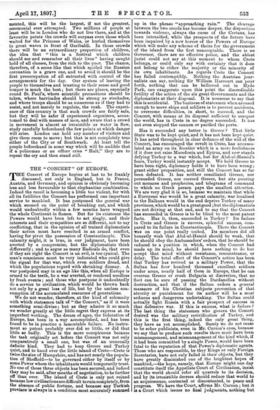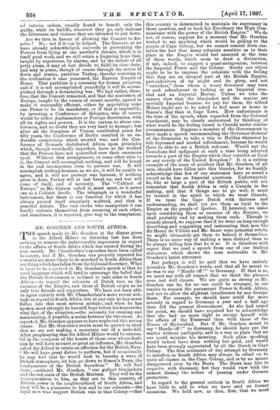THE " CONCERT " OF EUROPE. T HE Concert of Europe
begins at last to be frankly discussed, not only in England, but in France, Austria, and Germany, and opinion is obviously becoming less and less favourable to that elephantine combination. Indeed the recoil is becoming a little too violent, for with all its futilities the Concert has performed one important service to mankind. It has postponed the general war which seemed on the point of breaking out, and which would undoubtedly within a few months have wrapped the whole Continent in flames. But for its existence the Powers would have been left to act singly, and their interests and their sympathies are so different, not to say conflicting, that in the opinion of all trained diplomatists their action must have resulted in an armed conflict, having for pivot the possession of Constantinople. This calamity might, it is true, in our judgment, have been averted by a compromise, but the diplomatists think differently ; and to argue as many Radicals do, that even if they are right the Concert is an evil, is too cynical. The man's conscience must be very indurated who could give the signal for that war, which even soldiers dread, and which the populations regard with shrinking dismay. A war postponed may in an age like this, when all Europe is armed to the teeth, be a war averted, or rendered needless by fresh events ; and those who postpone it undoubtedly do a service to civilisation, which would be thrown back not only by a great loss of life, but by the useless con- sumption of the accumulated resources of generations.
We do not wonder, therefore, at the kind of solemnity with which statesmen talk of " the Concert," as if it were something semi-divine ; but as they admire it so much we wonder greatly at the little regret they express at its imperfect working. The dream of ages, the federation of Europe, has been in a way accomplished, and has been found to be in practice a lamentable failure. No instru- ment so potent probably ever did so little, or did that little so badly. This is the more conspicuous because the task originally set before the Concert was not only comparatively a small one, but was of an unusually definite kind. They had to keep Greece and Turkey quiet, and to hand over the little island of Crete—Crete is twice the size of Hampshire, and has not nearly the popula- tion of Sheffield—to be governed either by itself or by some Power whom the inhabitants would temporarily trust. No one of those three objects has been secured, and indeed they may be said, after months of negotiation, to be farther off than ever. The island of Crete is only not ruined because low civilisations are difficult to ruin completely, from the absence of public fortune, and because any Turkish province is always in a condition most accurately summed up in the phrase "approaching ruin." The cleavage between the two creeds has become deeper, the disposition towards violence, always the curse of the Cretans, has been intensified, while the prospects of the future have been impaired by a new horror of the Powers of Europe which will make any scheme of theirs for the government of the island from the first unacceptable. There is no Governor, there are no effective police, and the ablest jurist could not say at this moment to whom Crete belongs, or could only say with certainty that it does not belong to either the majority or the minority of its own inhabitants. As regards Crete the Concert has failed contemptibly. Nothing the Austrian jour- nalists can say, nothing Sir William Harcourt can pour forth, nothing that can be bellowed out in Hyde Park, can exaggerate upon this point the discreditable futility of the action of the six great Governments and the diplomatists at their disposal. It is nonsense to say that this is accidental. The business of statesmen when aroused enough to move ships and soldiers is to prevent accidents, to overcome difficulties, in short, to succeed, and the Concert, with means at its disposal sufficient to conquer the world, has in Crete in no degree succeeded. It has not even stopped the cannon or pacified the ports.
Has it succeeded any better in Greece ? That little State was to be kept quiet, and it has not been kept quiet. It has acted throughout in clear defiance of the will of the Concert, has encouraged the revolt in Crete, has accumu- lated an army on its frontier -which is a mere foolishness if it does not raise Macedonia and Epirus, and now stands defying Turkey to a war which, but for Abd.ul-Hamid's fears, Turkey would instantly accept. We hold Greece to have been right, diplomacy holds it to have been wrong; grant either proposition, and still the Concert has so far been defeated. It has neither conciliated Greece, nor persuaded Greece, nor coerced Greece, but sits pouring out menaces and prophecies, and telegrams of command to which no Greek person pays the smallest attention. We are very glad it is so, because we maintain that while a European war would be a great calamity, war localised to the Balkans would in the end deprive Turkey of many provinces, which would be a great good ; but the di plomatists are not driving at that end, and to say that the Concert has succeeded in Greece is to be blind to the most patent facts. Has it, then, succeeded in Turkey ? Its failure in Crete and Greece is success, splendid success, com- pared to its failure in Constantinople. There the Concert was on one point really united. Its members did all honestly wish that Abd-ul-Hamid should be weak, that he should obey the Ambassadors' orders, that he should be reduced to a position in which, when the Concert had made up its mind, he should have nothing to do but accept that mind without resistance, remonstrance, or delay. The total effect of the Concert's action has been that Turkey has revived as a military Power, that the Sultan has four hundred thousand excellent soldiers under arms, nearly half of them in Europe, that he can overrun Greece or crush Bulgaria at discretion, that no fleet can be sure of passing the Dardanelles without destruction, and that if the Sultan orders a general massacre of his Christian subjects prevention of that atrocity or punishment for its author will be a most arduous and dangerous undertaking. The Sultan could actually fight Russia, with a fair prospect of success in that defensive war. If this is success, what is failure ? The last thing the statesmen who govern the Concert desired was the military revivification of Turkey, and this is the first thing, indeed the only great thing,. they have as yet accomplished. Surely we do not cease to be sober publicists, even in Mr. Curzon's eyes, because we say that to produce such results there must have been mismanagement, and mismanagement of the kind which, if it had been committed by a single Power, would have been fatal to the reputation of that Power's diplomatic agents. Those who are responsible, be they Kings or only Foreign Secretaries, have not only failed in their objects, but they have greatly diminished one of the brightest hopes of mankind,—the hope, namely, that Europe might one day constitute itself the Appellate Court of Civilisation, insist that the world should refer all quarrels to its decision, and by its irresistible decrees should reduce that world to an acquiescence, contented or discontented, in peace and progress. We have the Court, affirms Mr. Curzon ; but it is a Court which issues no final judgments, nothing but ad interim orders, usually found to benefit only the guilty, while its bailiffs, wherever they go, only increase the bitterness and violence they are intended to put down.
Are we then in favour of allowing the Concert to dis- solve ? No ; not if it can be helped. The Concert, as we have already acknowledged, succeeds in preventing the Powers from flying at one another's throats, which is in itself good work, and we still retain a lingering hope that, taught by experience, by alarms, and by the failure of all petty plans, it may at last decide to fulfil its clear duty, and may in peace, though of course through the action of fleets and armies, partition Turkey, thereby restoring to the civilisation it once possessed, the Eastern Empire of Rome. That partition is a necessity for human progress, and if it is not accomplished peacefully it will be accom- plished through a devastating war. We had rather, there- fore, that the Concert remained, and that the statesmen of Europe, taught by the events of recent months, agreed to make it reasonably efficient, either by appointing some one Power to be its mandatory, or if that is impossible, by investing a Conference of delegates, who of course would be either Ambassadors or Foreign Secretaries, with all its rights and powers. It is the custom to abuse con- ferences, and no doubt they are very hard to manage; but after all the Congress of Vienna established peace for fifty years, the Conference of Berlin resulted in an en- durable compromise which averted war, and the Con- ference of Brussels distributed Africa upon principles which, though wretchedly imperfect, have so far worked that the Powers have not quarrelled over their enormous spoil. Without this arrangement, or some other akin to it, the Concert will accomplish nothing, and will be found in the end incompetent even to prevent war. It will accomplish nothing because, as we see, it will be unable to agree, and it will not prevent war because, if nothing great is done, Turkey will at last break up, and war will come of itself, and of necessity. The " Cabinet of Europe," as Mr. Curzon called it, must meet, or it never can as a Cabinet decide. The telegraph is a wonderful instrument, but there is one function for which it has always proved itself singularly unfitted, and that is peaceful debate. The very clerks who manipulate it can hardly restrain themselves from swearing at each other, and sometimes, it is reported, give way to the temptation.



































 Previous page
Previous page